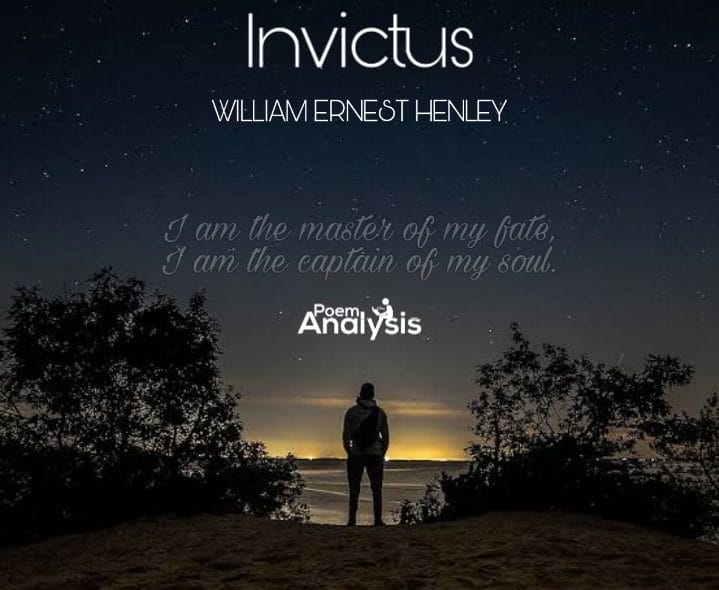The poem was first published in 1888—without a title—in Henley’s first volume of poetry. The title of the poem, ‘Invictus,’ which is Latin for “unconquered,” was given by the editor of “The Oxford Book of English Verse.”
This poem is a favorite in popular culture, making appearances in movies such as Casablanca and the Nelson Mandela movie of the same name. Politicians and authors also love to quote the inspirational last two lines of the poem:
I am the master of my fate,
I am the captain of my soul.
Invictus William Ernest HenleyOut of the night that covers me, Black as the pit from pole to pole, I thank whatever gods may be For my unconquerable soul.In the fell clutch of circumstance I have not winced nor cried aloud. Under the bludgeonings of chance My head is bloody, but unbowed.Beyond this place of wrath and tears Looms but the Horror of the shade, And yet the menace of the years Finds and shall find me unafraid.It matters not how strait the gate, How charged with punishments the scroll, I am the master of my fate, I am the captain of my soul.
Summary
‘Invictus’ by William Ernest Henley(Poems) talks about the invincibility of a person who trusts himself or herself.
In this poem, the speaker is faced with seemingly insurmountable challenges. Throughout it all, however, he perseveres and is successful in his endeavors. He faces each challenge with courage and is not afraid, and he can surmount any hardship. “In the fell clutch of circumstance” or “Under the bludgeonings of chance,” he has not bowed his head. However, he knows at some point in time, one has to enter the horrid palace of death.
But, it shall find the speaker unafraid. It does not matter to him how narrow the gate to heaven is. Neither the “punishments” inscribed on the “scroll” makes him frightened. It is his self-belief and courage that will sail him through all the difficulties.
Invictus Meaning
‘Invictus‘ is a Latin adjective meaning “unconquered, unsubdued, invincible.” It is a combination of two Latin words, “in,” meaning “not, opposite of” and “victus.” The word “victus” has come from the past participle of “vincere,” meaning “to conquer, overcome.”
Collectively, the word “Invictus” means one who cannot be conquered, meaning unconquerable. However, the poem was published in 1888 in his first volume of poems, “Book of Verses,” without a title. Later, the poem was reprinted in several 19th-century newspapers under various titles such as “Myself,” “Master of His Fate,” “Captain of My Soul,” and “De Profundis.” The well-known title ‘Invictus’ was added to the poem by Arthur Quiller-Couch, the editor of the “Oxford Book of English Verse (1900).”
Structure
‘Invictus,’ a Victorian poem, is made up of four stanzas and sixteen lines, with four lines in each stanza. It has a set rhyme scheme of abab cdcd efef gbgb. The poem also has a set metrical pattern. Each line of this poem contains eight syllables, and the stress falls on the second syllable of each foot, a segment of two syllables. Hence, the poem is written in iambic tetrameter. However, there are a few variations in the poem. As an example, the first feet of the first and second lines of the poem are trochaic. It means the stress falls on “Out” and “Black” in the first and second lines, respectively. The rising rhythm of the poem sets an optimistic mood in the poem.
Literary Devices
The poem begins with a personification. Here, the poet personifies the “night” that covers the speaker in “Black.” In the second line, there is a simile, and the comparison is made between the darkness of night and the color of the pit. The first stanza ends with an ironic note. In the second stanza, the poet uses a metaphor in “fell clutch of circumstance.” There is another metaphor in the “bludgeonings of chance.”
The third stanza contains a metonym for the earth in “this place of wrath and tears.” The last line of this stanza contains a repetition of the verb “find,” and this poetic device is known as palilogy. The last stanza contains an allusion to a phrase present in Matthew 7:14. Moreover, in the last two lines of this stanza, Henley uses metaphor and epigram as well.
Themes
In ‘Invictus,’ W. E. Henley is concerned with several themes such as suffering and rejuvenation, fatalism, free will, homocentrism or anthropocentrism, realism, and agnosticism. The most important theme of the poem is suffering and rejuvenation. Here, the speaker talks about the sufferings in his life and how he conquered everything that came his way to rampage his self-belief. The power of rejuvenation helped his mind be fresh again after getting defeated by fate. Thereafter, the poet throws light on the theme of fate vs. free will. According to the poet, one must act by his will and mind. Fate is just an abstract idea that obstructs one’s thought process.
Apart from that, the theme of homocentrism is another important aspect of the poem. It deals with the belief that man is the center of the universe. The out-worldly agents have no control over one’s mind or soul. Lastly, Henley wrote this poem to express his disbelief in conventional notions regarding God or fate. It is a poem emphasizing the significance of free will and rationalism. In this way, Henley successfully projected the spirit of the late Victorian period.
Tone and Mood
The overall tone of the poem is optimistic, direct, rational, and ironic. The mood of the poem is dark and gloomy. It seems as if the poet wrote this poem from the perspective of a person who is courageously fighting the odds of his or her life in a dark and upsetting phase. Moreover, the mood changes as the poem approaches the end.
The expression of the speaker creates a serious yet uplifting mood inside the text. Whereas the tone of the first stanza is ironic and firm. In the following two stanzas, the speaker’s tone becomes firmer. In some respect, the tone also projects a sense of insecurity, but the courage of the speaker dominates it. In the last stanza, his voice contains a tone of rejection, and it becomes more authoritative.
Analysis, Stanza by Stanza
Stanza One
Out of the night that covers me,
Black as the pit from pole to pole,
I thank whatever gods may be
For my unconquerable soul.
In the first stanza of ‘Invictus,’ the speaker immediately sets the stage for his reader. He says, “Out of the night that covers me,/Black as the Pit from pole to pole.” Henley’s use of imagery is strong from the very first line of the poem. It is quite easy for the reader to picture a complete night. In these two lines, the poet also creates a metaphor, as the night to which the speaker refers can represent any quandary in which the speaker finds himself.
Moreover, it is important here to think about the connotations of the word “night.” Since it is dark and one cannot see, it is easy for horrible things to happen, particularly when the night is “black as the Pit.” It is also curious that Henley chose to capitalize “Pit,” using a simile to compare the darkness of the night to this hole. One reason Henley may have chosen to capitalize “Pit” is to refer to Hell, which is considered to be the bleakest and blackest of places.
Thereafter, by using the phrase “from pole to pole,” the poet conjures up an image of the world, and it gives an almost nautical feel to the poem. It can be inferred, particularly when one knows the occupation of the man to whom the poem was dedicated, that our fearless speaker is perhaps a captain of a ship, particularly when he gives himself that title at the end of the poem.
In the next two lines of the first stanza, Henley writes, “I thank whatever gods may be/ For my unconquerable soul.” While the speaker does not know which Higher Beings truly exist, he takes the time to thank them for giving him a soul that cannot be conquered. Perhaps Henley’s use of the word unconquerable here is what inspired the editor of “The Oxford Book of English Verse” to title the poem ‘Invictus.’
Stanza Two
In the fell clutch of circumstance
I have not winced nor cried aloud.
Under the bludgeonings of chance
My head is bloody, but unbowed.
The second stanza is a continuation of the first. Henley writes, “In the fell clutch of circumstance/ I have not winced nor cried aloud.” In other words, the speaker has not allowed himself to become a victim of the events that have transpired in his life.
In these lines, Henley personifies circumstance, giving it human-like qualities to show just how tightly the events of one’s life can take hold. Throughout all that he has been dealt with, the speaker has not even cringed or cried about what has happened.
He does admit, however, in the next two lines that he has not emerged unscathed. Henley writes, “Under the bludgeonings of chance/ My head is bloody, but unbowed.” While he may have physical scars, he has never bowed his head in defeat; instead, he has kept it held high. Henley also employs alliteration in this stanza, repeating the “b” sound, which creates a harsh rhythm to the poem.
Stanza Three
Beyond this place of wrath and tears
Looms but the Horror of the shade,
And yet the menace of the years
Finds and shall find me unafraid.
The third stanza of ‘Invictus’ takes a darker turn, for the speaker refers to an afterlife that is filled with horror. Henley writes, “Beyond this place of wrath and tears/ Looms but the Horror of the shade.” The speaker seems to be saying here that he knows that what he has endured in this life is nothing compared to what lies ahead in the “shade,” which is a reference to death. He again tells his reader that he does not fear anything.
Lines eleven and twelve read, “And yet the menace of the years/ Finds, and shall find, me unafraid.” The speaker will remain fearless, even in the face of death and what comes after.
Stanza Four
It matters not how strait the gate,
How charged with punishments the scroll,
I am the master of my fate,
I am the captain of my soul.
The fourth stanza, while still fairly dark, is somewhat more uplifting, particularly in the last two lines of the poem. The nautical imagery once again returns in this stanza, with the speaker referring to himself as a captain but also commenting that it does not matter how narrow the path is to the gates of the afterlife; he will make it with no problems.
Moreover, when he is being judged, no matter how many punishments are listed, he will have decided his fate, and he will have steered his course. These last two lines are considered to be some of the most famous lines in all of literature, and they are a continued source of inspiration for people from all walks of life.
These lines to ‘Invictus’ are some of the most powerful and poignant lines in all of poetry, recognized around the world. To give such lines justice, we made sure to do a deeper analysis and understanding of these lines by particularly looking at ‘I am the master of my fate, / I am the captain of my soul.’
Historical Context
Many scholars believe Henley wrote this poem about himself since he wrote it while lying in a hospital bed. Henley was very sick as a young boy, which later resulted in him contracting an infection that spread to his leg. The leg was amputated, and doctors thought they would have to do the same to the other leg, as well, but Henley persuaded another doctor to try a new treatment that was able to prevent amputation. Many Victorian writers often incorporated nature into their poetry, and Henley continued this trend, which is quite evident in the lines of ‘Invictus.’
Nelson Mandela and Invictus
Nelson Rolihlahla Mandela, a South African revolutionary and President of South Africa (1994-1999), was influenced by the verbal energy and inspirational elements of Henley’s poem, ‘Invictus’. When he was incarcerated at the Robben Island prison, he recited this poem to other prisoners. The message of self-mastery in this poem touched Mandela deeply. (Source: Nelson Mandela: A Very Short Introduction by Elleke Boehmer, Tom Lodge).
Nelson Mandela has been depicted in films on multiple occasions. In Invictus (2009), a biographical sports drama film based on John Carlin’s “Playing the Enemy: Nelson Mandela and the Game That Made a Nation” (2008), he was depicted presenting a copy of the poem to Francois Pienaar, captain of the national South African rugby team for inspiration during the 1995 Rugby World Cup.
Though at the actual event, Mandela gave him a text of “The Man in the Arena” passage from Theodore Roosevelt’s “Citizenship in a Republic” speech delivered in France in 1910.
About William Ernest Henley
William Ernest Henley(Poems) was born on 23 August 1849 in Gloucester. He was an English poet, writer, critic, and editor in the late Victorian period. He wrote several books of poetry, but he is most famous for his 1875 poem ‘Invictus.’
From the age of 12, Henley suffered from tuberculosis of the bone. The ailment resulted in the amputation of his left leg below the knee in 1868-69. In the early 1870s, he faced a similar problem with his other leg. Then, he chose to travel to Edinburgh in August 1873 for treatment under the renowned English surgeon Joseph Lister.
Fortunately, the doctor saved his remaining leg. While he was recovering, he wrote the verses that became the poem ‘Invictus.’ In 1902, Henley fell from a railway carriage, which caused his latent tuberculosis to flare up. He died of it on 11 July 1903, at the age of 53.
FAQs
Henley wrote ‘Invictus’ while he was recovering from a serious illness. He endured years of physical pain and underwent a leg amputation. The poem is believed to reflect his personal resilience and defiance in the face of his own suffering.
The most notable reference to ‘Invictus’ is its use by Nelson Mandela, the former President of South Africa. While imprisoned for 27 years, Mandela found solace and inspiration in the poem’s message of personal strength.
This poem is important because it highlights the enduring power of the human spirit and the ability to overcome adversity. The themes explored in this poem resonate with people from various backgrounds and cultures.
The poem uses concise yet impactful language, conveying the message in a direct and forceful manner. The poem follows a consistent and structured form, with four stanzas, each containing four lines.
Similar Poetry
Here is a list of a few poems that depict the themes present in Henley’s poem, ‘Invictus.’ One can refer to the following poems, similar to that of Henley, for further reference.
- ‘Nothing to fear but fear itself‘ by Franklin D. Roosevelt(Poems) – Roosevelt used this phrase in his inauguration speech. Through this phrase, he tried to encourage his fellow citizens to be faithful and courageous.
- ‘Ulysses‘ by Alfred Lord Tennyson(Bio | Poems) – This is one of the best Alfred Tennyson poems. In this poem, Tennyson talks about the courage and will of Ulysses.
- ‘Power‘ by Adrienne Rich(Bio | Poems) – This one of the best poems by Adrienne Rich is about the power of the mind. It is a eulogy to the dead scientist Marie Curie.
- ‘Courage‘ by Anne Sexton(Bio | Poems) – In this poem, the poet conveys the different ways in which one can show courage, ranging from the seemingly insignificant to the heroic.
You can read about the best self-love poems here.





what an educated fellow!! will you be a dear and write my poem analysis for 3 shillings. Thy son you work is my playground and shily me not i critique thy identy theft.
I love the fact that you spelt Shakespeare in one of the many ways that Shakespeare spelt Shakespeare!
Love love love love love it